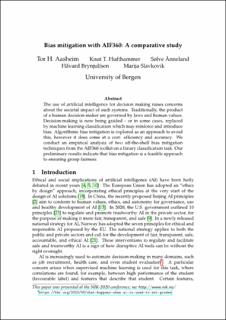| dc.contributor.author | Hufthammer, Knut T. | |
| dc.contributor.author | Aasheim, Tor H. | |
| dc.contributor.author | Ånneland, Sølve | |
| dc.contributor.author | Brynjulfsen, Håvard | |
| dc.contributor.author | Slavkovik, Marija | |
| dc.date.accessioned | 2021-07-13T07:55:29Z | |
| dc.date.available | 2021-07-13T07:55:29Z | |
| dc.date.created | 2020-12-15T11:14:28Z | |
| dc.date.issued | 2020 | |
| dc.identifier.isbn | 978-3-540-68164-9 | |
| dc.identifier.issn | 1892-0713 | |
| dc.identifier.uri | https://hdl.handle.net/11250/2764230 | |
| dc.description.abstract | The use of artificial intelligence for decision making raises concerns about the societal impact of such systems. Traditionally, the product of a human decision-maker are governed by laws and human values. Decision-making is now being guided - or in some cases, replaced by machine learning classification which may reinforce and introduce bias. Algorithmic bias mitigation is explored as an approach to avoid this, however it does come at a cost: efficiency and accuracy. We conduct an empirical analysis of two off-the-shelf bias mitigation techniques from the AIF360 toolkit on a binary classification task. Our preliminary results indicate that bias mitigation is a feasible approach to ensuring group fairness. | en_US |
| dc.language.iso | eng | en_US |
| dc.publisher | Norsk IKT-konferanse for forskning og utdanning | en_US |
| dc.relation.ispartof | NIKT: Norsk IKT-konferanse for forskning og utdanning 2020 | |
| dc.title | Bias mitigation with AIF360: A comparative study | en_US |
| dc.type | Chapter | en_US |
| dc.description.version | publishedVersion | en_US |
| cristin.ispublished | true | |
| cristin.fulltext | original | |
| dc.identifier.cristin | 1859922 | |
| dc.identifier.citation | NIK Norsk informatikkonferanse. 2020, 1. | en_US |
